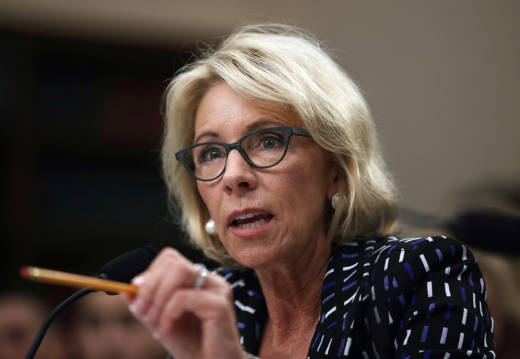And, OCR stepped up its own investigations of campuses over Title IX complaints. If colleges didn't comply, they stood to lose access to federal student aid, which almost no school can afford to do.
Colleges hired Title IX compliance officers -- dozens at schools like Yale and Harvard. They created new rules, policies and procedures. Students, faculty and staff took mandatory training on sex abuse and harassment. The Education Department launched hundreds of investigations, some of which have dragged on for years.
Legal experts and faculty have found fault. Last year, an open letter signed by 21 professors at leading law schools argued that "free speech and due process on campus are now imperiled."
Similarly, a report last year from the American Association of University Professors found, "questions of free speech and academic freedom have been ignored" in what it called "abuses" of Title IX.
In an emotional address, DeVos told anecdotes about accused students contemplating, and committing suicide. She mentioned a controversial case in which a University of Southern California football player was expelled for what his girlfriend says was merely "playful roughhousing."
She also denigrated sexual harassment codes that "trample free speech rights."
Now, what happens?
Not too much, argues Scott Schneider. Former associate general counsel of Tulane University, he now works with universities on Title IX compliance for the law firm Fisher Phillips. "None of my clients are going, 'Oh, wow. The Trump administration isn't as aggressive on enforcement now, we're going to scale back." The staffing-up and intensified investigations that happened the past several years are supported by advocates and prospective students, he says. However, he says that colleges may be ready to revisit policies with an eye toward improving due process for the accused.
"When you say 'sexual misconduct', that goes on a transcript and that kid has some serious problems," says Vanessa Grigoriadis, a journalist who reported on sexual mores across several different campuses for her new book "Blurred Lines: Rethinking Sex, Power & Consent On Campus."
"That kid gets suspended, expelled, humiliated, his parents are totally ostracized. There is real pain on the other side." At the same time, she points out, surveys consistently show that more than one in five female college students is a victim of sexual misconduct, most of which is never investigated or punished. "There is a lot of pain on the girls' side, too."
Copyright 2017 NPR. To see more, visit http://www.npr.org/.
